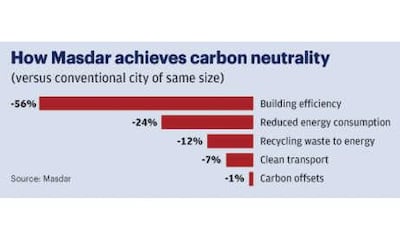Masdar City is set to reveal the carbon footprint of hundreds of materials that will be used to build the US$22 billion (Dh80.8bn) carbon-neutral development at the edge of the capital. The data, from Masdar's efforts to procure low-carbon cement, aluminium, steel and other materials for its groundbreaking city, covers 400 products plucked from the many advertised as environmentally friendly, said Richard Reynolds, the department supply chain manager at Masdar City. It will be disclosed by the end of this year.
"I'm trying to filter out the greenwash," he said, referring to industry hyperbole. "We have an obligation to go back into industry and look at ways of reducing the carbon footprint of manufacturing." Masdar City has significant market clout: if built to the scale envisioned in the master plan, it will buy as much as $4bn worth of basic materials, Mr Reynolds said. Basic materials such cement, aluminium and steel are produced across the GCC using large amounts of energy, nearly all of which comes from fossil fuels. These heavy industries loudly advertise energy efficiency drives and extra investments in filters to reduce pollutants, but the products' full impact on the environment can be determined only after a wide-ranging audit that takes account of the types of raw materials, the energy intensity of transportation needs and each step of the company's factory process.
Before Masdar - which expects to welcome the first residents to the city by the end of summer - created a market for that information, manufacturers in the UAE and across the region had no reason to perform such audits of their operations, Mr Reynolds said. "What we want to do is to take that product we found and put it in a directory," he said. "At the same time, that's a marketing opportunity (for industry)."
Masdar has also partnered with a number of companies to help them reduce the carbon footprint of their manufacturing. The company has worked for three years with Gulf Extrusions, a downstream aluminium maker in Jebel Ali that produces building claddings and windows, to develop a new type of aluminium that created less carbon emissions but held up as well as standard metal. The result was a metal made up of 80 per cent recycled aluminium and 20 per cent new aluminium produced from a smelter powered by geothermal electricity, said Modar al Mekdad, the general manager of Gulf Extrusions. Mr al Mekdad did not specify the origin of the 20 per cent new aluminium, but Iceland hosts the world's only smelter that uses electricity from geothermal sources.
The total emissions from producing and transporting each kilogram of the "green" aluminium is 5.7kg of carbon dioxide, Mr al Mekdad said, which represents a 48 per cent reduction from the average carbon footprint of aluminium produced at a smelter using natural gas, such as the plants in Jebel Ali and Taweelah. Gulf Extrusions was forced to import the crushed aluminium cans and other recycled scrap from Germany, Mr al Mekdad said, since the UAE does not have extensive recycling programmes of its own.
The increased emissions from moving the scrap from Europe to the UAE were outweighed by the energy benefit of making aluminium from recycled materials rather than raw alumina, and the price of the product would be competitive if production rates were increased, he added. The company invested Dh6 million in developing the new metal, Mr al Mekdad said, and has now received customer inquiries from the UK, Japan and the Netherlands.
Masdar is also working with cement companies to recycle waste slag that is a byproduct of the manufacturing business. As well, it is looking to introduce costly technology to the Emirates Steel Industries plant in Musaffah that would make the company's product more environmentally friendly by capturing the plant's carbon emissions and burying them. @Email:cstanton@thenational.ae

